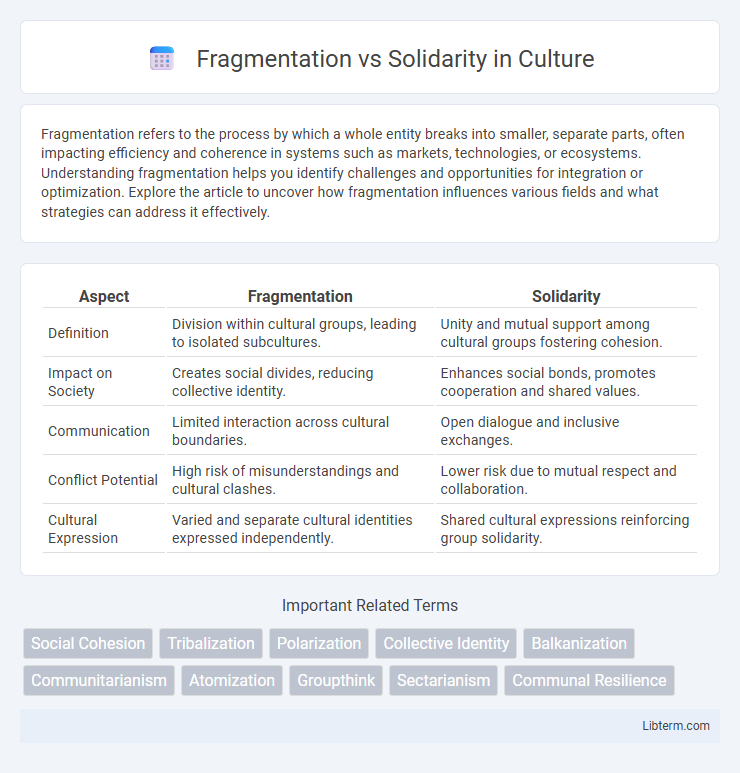Fragmentation refers to the process by which a whole entity breaks into smaller, separate parts, often impacting efficiency and coherence in systems such as markets, technologies, or ecosystems. Understanding fragmentation helps you identify challenges and opportunities for integration or optimization. Explore the article to uncover how fragmentation influences various fields and what strategies can address it effectively.
Table of Comparison
| Aspect | Fragmentation | Solidarity |
|---|---|---|
| Definition | Division within cultural groups, leading to isolated subcultures. | Unity and mutual support among cultural groups fostering cohesion. |
| Impact on Society | Creates social divides, reducing collective identity. | Enhances social bonds, promotes cooperation and shared values. |
| Communication | Limited interaction across cultural boundaries. | Open dialogue and inclusive exchanges. |
| Conflict Potential | High risk of misunderstandings and cultural clashes. | Lower risk due to mutual respect and collaboration. |
| Cultural Expression | Varied and separate cultural identities expressed independently. | Shared cultural expressions reinforcing group solidarity. |
Understanding Fragmentation and Solidarity
Fragmentation refers to the process where groups or societies become divided into smaller, isolated units, leading to weakened social cohesion and increased conflicts. Solidarity represents the unity and mutual support within a group, fostering collective identity and shared purpose. Understanding fragmentation and solidarity involves analyzing social, cultural, and political dynamics that influence group interactions and the balance between division and unity.
Historical Roots of Social Division
The historical roots of social division between fragmentation and solidarity stem from economic disparities established during the industrial revolution, where class stratification intensified due to unequal access to resources and labor exploitation. Colonialism further entrenched divisions by imposing hierarchical structures that privileged certain ethnic or racial groups, leading to long-term social fragmentation. Social movements and collective struggles against oppression have periodically fostered solidarity, challenging these deep-seated divisions through shared identity and common goals.
Drivers of Fragmentation in Modern Societies
Drivers of fragmentation in modern societies include economic inequality, cultural polarization, and technological disruption. Social media algorithms amplify echo chambers, intensifying ideological divides and reducing cross-group dialogue. Urbanization and migration patterns further complicate social cohesion by creating heterogeneous communities with competing interests.
The Power of Collective Solidarity
Collective solidarity amplifies social cohesion by uniting diverse individuals around shared goals, fostering resilience against fragmentation caused by social, economic, or political divisions. This unity enables communities to pool resources, as seen in labor movements and social justice campaigns, driving significant societal change through collective action. The power of solidarity lies in its ability to transform isolated struggles into a formidable force, reinforcing mutual support and sustained advocacy for common interests.
Impact on Political Movements
Fragmentation undermines political movements by creating divisions that weaken unified strategies and dilute collective goals, reducing their effectiveness in achieving policy changes. In contrast, solidarity strengthens movements through cohesive action and shared purpose, enhancing their ability to mobilize resources and sustain long-term campaigns. The extent of solidarity directly correlates with the movement's capacity to influence political agendas, while fragmentation often leads to diminished public support and internal conflicts.
Fragmentation in the Digital Age
Fragmentation in the digital age refers to the growing divide among online communities caused by algorithm-driven echo chambers and personalized content feeds, which limit exposure to diverse perspectives. This phenomenon intensifies polarization, as individuals increasingly engage with information that reinforces their existing beliefs, undermining collective social cohesion. Data from studies on social media usage indicate that fragmented digital environments reduce cross-group dialogue and contribute to societal fractures.
The Role of Leadership in Fostering Unity
Effective leadership plays a pivotal role in bridging fragmentation by promoting inclusive communication and shared goals. Strong leaders cultivate a sense of solidarity through empathy, conflict resolution, and empowering diverse voices within a group. This approach fosters cohesion, boosts collective morale, and drives unified action towards common objectives.
Consequences for Community Well-being
Fragmentation in communities often leads to decreased social cohesion and trust, resulting in weakened support networks and increased isolation among members. Solidarity enhances collective action and resource sharing, fostering resilience and improved mental health outcomes. Strong solidarity correlates with higher community well-being through cooperative problem-solving and equitable access to opportunities.
Case Studies: Fragmentation vs Solidarity Worldwide
Fragmentation and solidarity manifest differently across global case studies, exemplifying how social, political, and economic divides shape societies. In regions like the Balkans, fragmentation driven by ethnic tensions contrasts sharply with Nordic countries, where strong social welfare systems promote solidarity. The Arab Spring highlights fragmentation due to political unrest, while community-driven initiatives in Rwanda demonstrate post-conflict solidarity fostering national reconciliation and development.
Pathways to Rebuilding Solidarity
Pathways to rebuilding solidarity emphasize inclusive dialogue, equitable resource distribution, and community empowerment to counteract social fragmentation. Strengthening social networks and fostering shared identities through collaborative initiatives enhance mutual trust and collective resilience. Implementing policies that promote social justice and address systemic inequalities is crucial for long-term solidarity restoration.
Fragmentation Infographic

 libterm.com
libterm.com